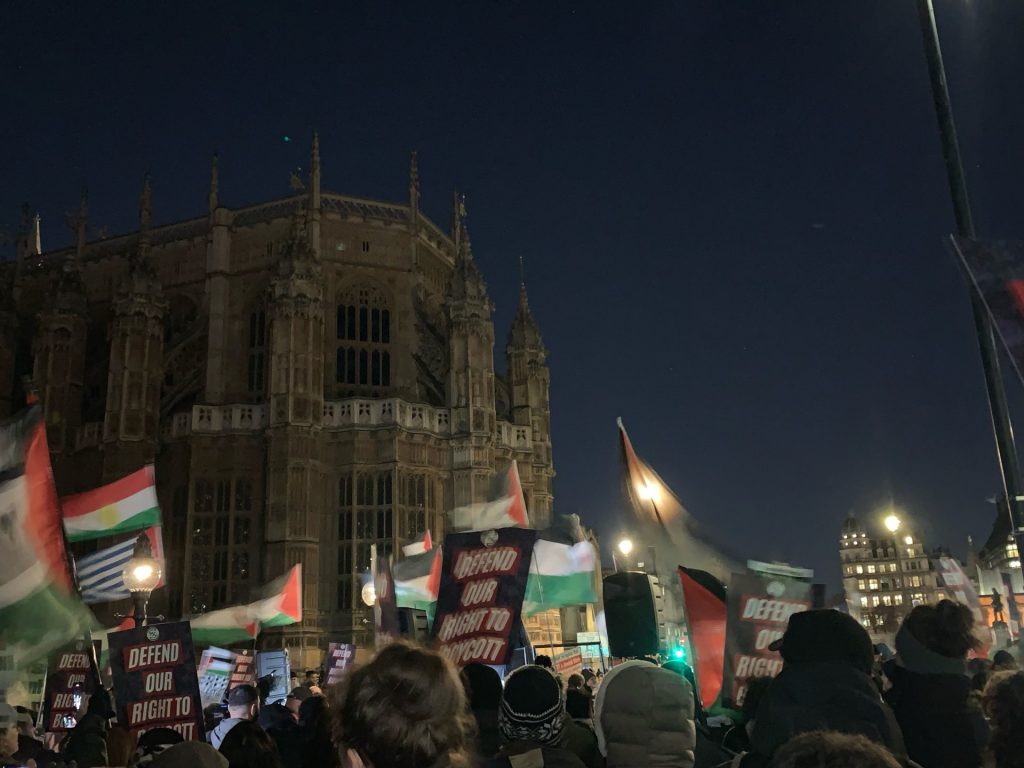A bill which would make it unlawful for public bodies to engage in boycotts of foreign states passed in the House of Commons last night, despite significant backlash and protests.
The Economic Activity of Public Bodies Bill, commonly referred to as the anti-BDS bill, will encompass all public bodies, including local councils, the NHS and UK universities.
The third reading was the final chance for the MPs in the Commons to debate and vote on the bill, which passed by 282 to 235 votes.
It will now make its way through the House of Lords.
Ben Jamal, the director of the Palestinian Solidarity Campaign (PSC), the biggest organisation in the UK dedicated to securing Palestinian human rights, explained the wide-reaching opposition to the bill.
Jamal said: “There has been a unified coalition against this bill from various sides of the political spectrum, who have all come out to reject the government’s attempt to attack the Palestine Solidarity movement.”
“We are united in a belief that boycotting, which is a fundamental expression of democratic rights, should not be curtailed by the government.”
Communities Secretary Michael Gove introduced the government bill in June 2023, which has also faced some internal opposition from Tory backbenchers, with nine Conservative MPs voting against the bill yesterday.
Hundreds of demonstrators gathered outside Parliament to express their opposition to the contentious bill.

Jamal said: “This bill sets a dangerous precedent for the democratic rights of people in the UK.
“Not only regarding providing solidarity for Palestinians, but this bill will also make it unlawful to show any form of protest against climate change and other global issues in the future.”
Jamal argued that the anti-boycott bill would hinder public bodies from leveraging procurement and investment policies to deter companies from doing business with Israel’s government and army.
The anti-boycott bill’s third reading comes at a time of widespread public debate about the UK government’s position on the crisis in Gaza.
Jamal said: “We cannot allow Israel to act with impunity in its human rights abuses in Gaza, this bill will facilitate their abhorrent campaign.”
“We will absolutely fight against this pernicious bill until the very end.
“We are prepared to rally and protest at the next stage outside the House of Lords.”
The Department for Levelling Up, Housing and Communities (DLUHC) replied to these comments.
Sacha Deshmukh, Amnesty International UK’s Chief Executive, said: “We shouldn’t be suppressing free speech, legitimate debate and human rights campaigning.
“We shouldn’t be in the business of investigating public officials for their opinions on important human rights issues.
“This draconian bill will stifle free speech among members of public bodies and undermine efforts to procure goods and services free from slavery, environmental harm and other human rights abuses.”
A DLUHC Spokesperson said: “Public bodies imposing boycotts on foreign countries not only undermine the UK’s foreign policy but can also fuel division across our communities.
“This change delivers on the government’s manifesto, stopping public bodies from wasting taxpayers’ money pursuing their own foreign policy agendas, and ensuring that the UK speaks with one voice internationally.”
More than 60 campaign groups have opposed the bill, including Amnesty International UK and Greenpeace.





